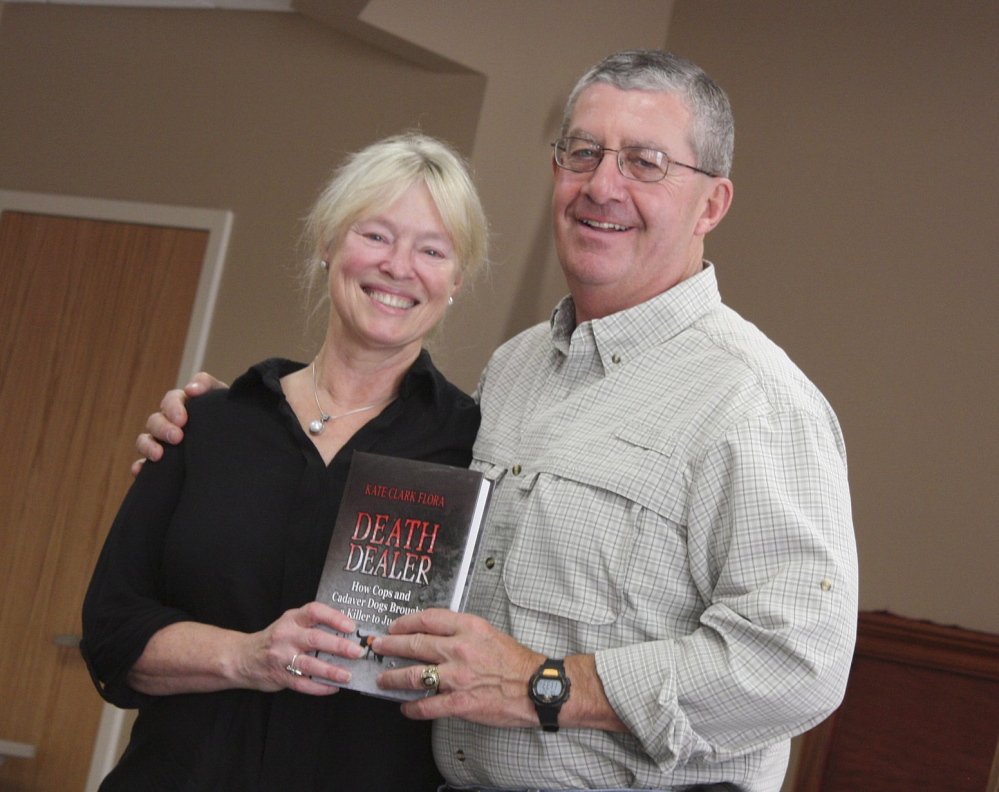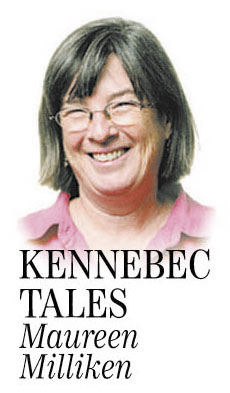Kate Flora was driving her aging BMW around the Concord, Mass., area where she lives, trying to bring the battery back to life.
“Between snow, frozen pipes, a dead car, I’m doing great,” she said with a laugh in a phone interview Tuesday.
Flora really is doing great. Her latest true-crime book, “Death Dealer,” released last fall by New Horizon Press, was recently nominated for an Agatha award, given by the Malice Domestic convention in the best non-fiction category. The awards are announced at the convention in Washington, D.C., in May.
If Flora wins the award, it wouldn’t be the first for a book she’s written. “Redemption,” a mystery novel, won the 2013 Maine Writers and Publishers Alliance Literary Award for Crime Fiction. Her first true crime book, “Finding Amy,” was nominated for an Edgar, awarded by the Mystery Writers of America and considered the Oscars of mystery writing.
Flora, who divides her time between Massachusetts and Maine, is no stranger to central Maine. She grew up on a farm in Union and has relatives in the Belgrade area. Her brother, John Clark, is librarian at the Hartland Public Library and is also a mystery writer.
Flora lived in Hallowell in the 1970s, when she was an assistant attorney general.
Central Mainers will also recognize the man Flora says is the hero of the book — Pat Dorian, recently retired as a lieutenant with the Maine Warden Service. Dorian, who lives in the Augusta area, at the time was search and rescue coordinator for the warden service and was instrumental in getting both search volunteers from the warden service and Maine Search and Rescue Dogs involved, eventually helping to solve the New Brunswick murder that’s at the heart of “Death Dealer.”
The book chronicles the murder of Maria Tanasichuk. Police in Miramichi, N.B., knew who did it — her husband, Dave Tanasichuk. But without her body, they couldn’t make a case. Over the course of their investigation, in fact, they realized David Tanasichuk was a serial killer. But evidence was scarce and they needed Maria’s body.
Dorian had been going to Miramichi to fish for 20 years and knew the area and people.
His familiarity with Flora helped, too.
After “Finding Amy,” which was published by Berkley in 2007, Flora vowed she was never going to write another true crime book. The book chronicled the 2001 disappearance of Amy St. Laurent in Portland, and Flora worked closely with Joe Loughlin, of the Portland Police Department, as well as the warden service and other law enforcement officers.
“It’s too hard,” she said of non-fiction writing Tuesday.
It’s a lot of work and “it takes too long.”
But more than that, unlike fiction, “You have to live with real dead people in your head.”
“No way I was writing another true crime book in this lifetime.”
But at the launch party for “Finding Amy,” Dorian, who also worked on the St. Laurent case, said to her, “Kate, when you’re ready, I’ve got another one for you.”
And when she started researching the Maria Tanasichuk murder, she was hooked.
The police investigation into the murder turned a corner when Dorian, along with a group of dog handlers from the Maine Warden Service and eventually some from Maine Search and Rescue Dogs, volunteered to go to Miramichi and look for the body.
Their involvement ended up being a huge commitment of time and involved two trips, but in the end, not only was Dorian a hero, but the dog handlers and dogs, particularly Deb Palman, at the time a warden service specialist and a trainer for MESARD, and her dog Alex.
The book took Flora five years to write — partially because of an appeal, retrial and more appeals.
Along the way, she learned a lot.
“There’s a huge dog lore piece to this book I didn’t think I’d be interested in,” Flora said.
Not only the general premise that if you write about dogs, readers will come, but also how the use of dogs in search and rescue has evolved.
Warden Roger Guay, who worked in the Greenville area, came to realize that the dogs and warden service searchers could do better when it comes to finding bodies, according to Flora.
One of the realizations was that dogs trained to find living people aren’t going to find cadavers.
The service, often with an assist from MESARD, has become one of the premier search outfits in the region.
Flora also learned that the warden service is unusual among law enforcement — all searches in Maine, in woods, lakes, rivers, is under its purview.
She said, because of that, the warden service “brings a tremendous amount of expertise” to searches.
She was also reminded about the level of insider access that comes with writing non-fiction, when those she’s writing about trust her enough to tell her their stories.
There’s a dramatically tense moment in the book when Miramichi Deputy Chief Brian Cummings goes outside in his underwear, searching his yard, gun in hand, sure that the suspect is stalking him and his family.
“That’s not a normal cop story you’re going to hear,” she said.
But the most important thing she learned — or re-learned after first realizing it with “Finding Amy” — is what a privilege it is to help tell the story, both the police story and the victims’ story.
“I was terrified at how they all were going to react” to the book, she said. “I was writing about real people, and didn’t want to get it wrong.”
But the reaction has been gratifying — they loved the book.
Even more, those who are featured in the book are getting notes and calls from others in their lives who had no idea what was going on, or what the police or victims’ families were going through.
“It’s a story that matters a lot to real people,” she said.
Agatha nomination aside, Flora feels a bigger benefit from books like “Death Dealer.”
“It’s not going to make me rich,” she said Tuesday as she continued to urge her aging BMW through the streets of Concord, Mass., trying to keep the battery alive. “It’s not going to make me famous.
“But I’m actually telling real stories about real people.”
Maureen Milliken is news editor of the Kennebec Journal and Morning Sentinel. Email her at mmilliken@centralmaine.com. Twitter: mmilliken47. Kennebec Tales is published the first and third Thursday of the month.
Send questions/comments to the editors.




